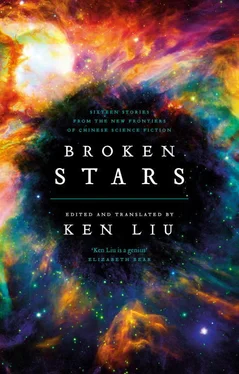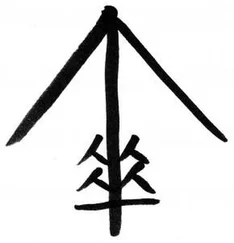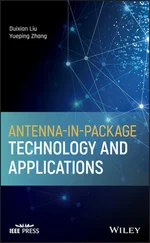I knock twice on the door, and then once. Someone seems to be stirring inside. I knock again. The door opens automatically.
Abbot Deta is sitting with his back to the door. Before him is a giant screen, completely dark. I seem to hear the low-frequency buzzing of electronics. He sighs loudly.
“Teacher! Your student is here!” I fall to my knees and prepare to kowtow.
“I think you’ve read Journey to the West too many times.” The abbot gets up, and I can see that his expression isn’t one of joy. “I told you to come at one minute past ten o’clock.”
I’m stumped for words. Apparently the master was using binary notation.
I hurry to hide my embarrassment. “Um… this afternoon—”
“It wasn’t your fault; I know what happened. As soon as you stepped into this temple, I learned everything about you.”
“… Then why did you accept me?”
“Though your heart wasn’t directed toward the Buddha, you have within you the root of wisdom. If I didn’t take you in, I’m afraid you might have sought refuge in suicide.”
“Master is indeed merciful.” I’m still completely as a loss.
“I know you don’t understand.” Master Deta isn’t actually that old. He’s barely in his forties. As he laughs with his glasses perched on his nose, he resembles a college professor.
“Forgive your foolish student, master. Please enlighten me.”
Master Deta waves his hand. The giant screen, apparently controlled by body motion, lights up. The image on the screen is difficult to describe: a gigantic, compressed oval whose background is various shades of blue, studded with irregular patches of orange-red dots. Or maybe it’s the other way around. I think the image resembles the false-color version of some planet’s topographic map, or maybe a slide full of multiplying mold seen through a microscope.
“What is this?”
“The universe. Or more precisely, the cosmic microwave background. This is the image of the universe about 380,000 years after the Big Bang. You’re looking at the most precise photograph of it so far.” His enthusiastic admiration contrasts sharply with his humble monk’s garb.
“Um…”
“This was made by computation based on the data gathered by the European Space Agency’s Planck space observatory. Look here, and here—do you see how the pattern is a bit odd?”
Other than patches of orange-red or cobalt mold, I can’t see what’s so special.
“Are you saying that… um… the Buddha doesn’t exist?” I ask tentatively.
“The Buddha teaches that the great trichiliocosm consists of a billion worlds.” He glares at me, as though forcing me to retract my words. “This picture proves that multiple universes once existed. After so many years of effort, humanity finally proved, through technology, the Buddhist cosmology.”
I should have realized this would happen. The abbot is just like the pyramid schemers in Zhongguancun—anything, no matter how unrelated, could be seen by them as powerful proof for their point of view. I try to imagine how a Christian might interpret this picture.
“Amitabha.” I put my palms together to show piety.
“The question is: why has the Buddha chosen now to reveal the truth to all of humanity?” He speaks slowly and forcefully. “I pondered this question for a long time, but then I saw your scheme.”
“Buddhagram?”
Master Deta nods. “I can’t say I approve of your methods. However, since you ended up coming here, that proves that my guesses were correct.”
Cold sweat seeps onto the skin at my back, not unlike that night so long ago that it seems unreal.
“This world is no longer the same as its original form. Put it another way: its creator, the Buddha, God, Deity—no matter what name you give it—has changed the rules by which the world operates. Do you really believe that the consecration was what allowed Buddhagram to perform miracles?”
I hold my breath.
“Suppose the universe is a program. Everything that we can observe is the result of the machine-executable code. But the cosmic microwave background can be understood as the record of some earlier version of the source code. We can invoke this code via computation, which means that we can also use algorithmic processing to change the version of the code that’s currently running.”
“You’re saying that Mr. Wan’s algorithm really caused all of this?”
“I dare not jump to conclusions. But if you forced me to guess, that would be it.”
“I’m pretty science-illiterate, master. Please don’t joke with me.”
“Amitabha. I am a Technologist-Buddhist. I believe in the words of Arthur C. Clarke: ‘Any sufficiently advanced technology is indistinguishable at first glance from Buddhist magic.’”
I know there’s something not quite right here, but I don’t know how to debate him. “But… but that project failed. Look at what a sad state Mr. Wan is in. I don’t think I have anything more to do with this.”
“What is not real? That which form possesses.
The Tathagata will be seen
When mind past form progresses.” [23] This is a quote from the Diamond Sutra .
“Master, please allow me to leave the temple and return to the secular world. I miss my wife.” A nameless fear suddenly seizes me like a bottomless pit rising out of the screen on the wall, trying to pull me in.
Master Deta sighs and smiles wryly, as though he has long since predicted all this.
“I was hoping that by studying Buddhist doctrine with me, you would be sufficiently calmed to stay here and wait out the catastrophe. But… you and I are both caught in the wheel of samsara, so how can we escape our destinies? All right. Take this as a memento of our time together.”
He hands over a gold-colored Buddha card. On the back is a toll-free number as well as a VIP account number and security code.
“Teacher, what is this?”
“Don’t lose it! The resale value of this card is 8,888 yuan. If anything happens, you can give me a call.”
Master Deta turns and waves his hand, and the moldy image on the screen is replaced by regular TV programming. An American quantum physicist has been killed by gunshot. Bizarrely, the shooter claims that it was an accident because he thought the victim was someone else.
110.
Half a year passes. I meet Lao Xu at Guanji Chiba, a popular barbecue restaurant in Zhongguancun.
Lao Xu hasn’t changed much. He’s still pathologically in love with barbecued lamb kidneys. Like a stereotypical Northeasterner, after a few bottles of beer, his face glowing with grease and jittering with emotion, Lao Xu begins to say what’s really on his mind.
“Chongbo, why don’t you come and join me again? You know I’ll take care of you.”
Animatedly, Lao Xu tells me what’s been going on with him, spewing flecks of spittle through the smoky haze. After he hid and rested for a while at home, another phone call drew him back into the IT world. This time, he didn’t start a marketing company with no future, but became an “angel investor.” With all the contacts he made among entrepreneurs, now he gets to spend other people’s money—the faster the better.
He thinks I have potential.
“What’s going on with Mr. Wan?” I change the subject. My wife has just found out that she’s pregnant. Although my current job is boring, it’s stable. Lao Xu, on the other hand, isn’t.
“I haven’t heard from him for a while…” Lao Xu’s eyes dim, and he takes a long drag on his cigarette. “Fortune is so fickle. Back when Buddhagram was on fire, a whole bunch of companies wanted to invest. An American company even wanted to talk about purchasing the whole company. But at the last minute, an American man showed up claiming that Y’s core algorithm was stolen from one of his graduate school research labmates. The American sued, and he just wouldn’t let it go. So the patent rights had to be temporarily frozen. All the investors scattered to the wind, and Lao Wan had to sell everything he owned… but in the end, it still wasn’t enough.”
Читать дальше












